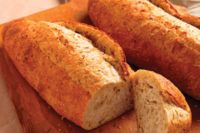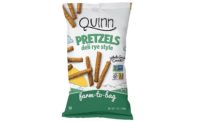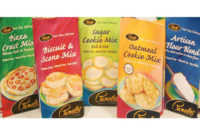Artisan baked goods from Labriola Baking Co. are so popular, it seems that the Alsip, Ill., bakery can’t produce them fast enough. Headed by president, owner and self-described “Chief Dough Boy” Rich Labriola, the bakery never forgets that, despite all of the recent success, artisan-quality baking is what it has to do and strives to do it better than anyone else.
Combining artisan baking methods in the handcrafting sense of the word with six automated production lines, Labriola Baking is a soaring star in the Chicagoland market, creating fresh, aromatic and crusty baguettes, Italian bread, focaccia, Pugliese, ficelle, Pullman loaves, boules, squares, ciabatta rolls, buns, Tuscan bread, homemade pretzel rolls and some of the tastiest sourdough around, just to name a few. The bakery also offers delectable cakes, cookies, coffee cakes, muffins, donuts, teabreads, Danish and other pastries that are mostly made by hand.
Labriola Baking has been in business since 1993, after Rich made a move from the distributor side of the business. Not born into a baking family (his father was in the pizza business), what Rich lacked in bakery experience at the time, he made up for with energy, drive and passion. “I first started out distributing bread for a company in Chicago from out of my car,” he remembers. “Within a year, I saw that baking looked like a good business to get into. Bakers enjoy what they do.”
In 1993, he started Labriola Baking with a plan, a loan and a 10,000-sq.-ft. baking facility in Alsip, producing, selling and delivering French and Italian bread around the area. “We kept expanding that space over the years,” Rich remembers. “It grew out of what I thought was a need to make better bread than what was available at the time.”
Rich is the first to admit that the bakery business wasn’t as easy as it looked. “It was tough at first; we really didn’t know what we were doing, so that forced me to learn how to bake, which was a good thing,” he remembers. “I spent several years learning how to bake.” But it didn’t take long before Rich knew he loved to bake. And bake he did. He read up on baking, took classes and studied. “If we have succeeded in anything, I think we have succeeded in that,” he says.
Artisanal start
In the years that followed, the bakery grew in popularity and size and Rich continued to acquire more skills. “When I first hired a baker, I asked him how much salt goes into 100-lb. quantity of flour,” he recalls. “He said ‘a tomato can’s worth.’ I thought there had to be more than that, so I went and got a can of tomatoes at the store and only then did I discover the can held a little more than 2 lb. of salt—and that’s the standard required for 100 lb. of flour. We still have that can somewhere. It came in handy when we were mixing the small batches.”
Things really started coming together in 1997, when Labriola Baking began making artisan bread. “That’s when we started getting noticed for having high-quality products and different types of breads,” Rich continues. “The mistake I made in the beginning was to make the same kinds of bread as the competition. The artisan factor was key. Not many bakeries were doing artisan at that time so artisan practices helped. We always look for an opening that’s not there.”
Artisan bread opened doors for Labriola Baking. The craftsmanship involved was a great way for the bakery to differentiate itself from the vast competition in the Chicago area. “We really focused on artisan bread, and that was the first really big lesson for me,” Rich points out. He learned what it takes to produce high-quality breads, rolls and buns.
And, in San Francisco, Rich learned how to make sourdough. “That was the next big thing for us,” he says. “Once you master sourdough, things get easier. You can pretty much master anything after that.”
Rich came back and made breads for Spago (Chicago), Wolfgang Puck’s famous restaurant, and won the prestigious account. “That really led to a lot for us,” he says. Labriola Baking won more and more clients over and enlarged its repertoire of crusty, flavorful breads, rolls, buns and other baked goods. Everything is made fresh daily, 24/7. Raisin, sunflower, potato rosemary, country olive and pretzel are just a few of the delicious flavors the bakery produces today. The top sellers are baguettes and sourdough.
The bakery continued to find success with sophisticated clients and became more automated. Today, its products are available in Chicagoland’s finest restaurants and hotels, as well as in supermarkets across the country, several special retail stores, farmers’ and produce markets and private-label through many Chicago-area supermarkets. Labriola Baking now offers several kinds of sourdough, such as a San Francisco variety, as well as the locally famous pretzel rolls, which are growing in popularity and used at the café as burger buns and accompaniments. The pretzel items get their distinct flavor from a caustic soda lye in which they’re submerged.
Breakthrough cafe
In 2008, Rich experienced another breakthrough: He opened an upscale café/bakery in suburban Oak Brook, Ill., which has quickly become a hit. Offering award-winning hamburgers, sandwiches, gelato, salads and more, Labriola Café/Bakery also houses a small bakery that sells various pastries from luxurious cakes to cookies, croissants muffins and pies. Rich says he discovered that people want food quickly, which has worked well for other fast-casual dining spots, but they also want better food. A charming interior design offset with a brick fireplace also grabs attention.
The café put Labriola Baking on the map, and the timing was perfect. “After the first year of opening, we expanded the café, adding 3,000 more sq. ft.,” notes Rob Burch, chief operating officer. “There are now about 180 seats, and we also have a little pastry kitchen there. So that was a big step in name recognition. In that area, eight out of 10 people know who Labriola Baking is, so it has been a big success.”
The cafe also exposed the bakery to more new customers. “We always wanted to open a café,” Rich says. “We said that every January, and never did it, but by 2007, we actually decided to start the process of finding a location and the search was a lot different than we expected. The real estate prices were loftier, too. But we knew the food had to really be good. So the café just evolved from a $2.5-million project to what it is now—a $5.5-million café. The Oak Brook area needed a place like the cafe at that time.”
Today, Labriola Baking has 330 employees, including those at the café. Annual sales are $36 million. The bakery in Alsip produces 380 stock-keeping units (SKUs). About 60% of the current business is from fresh breads; while 36% is from frozen and 4% is from pastry sales. Within the fresh segment, pretzel bread does probably 13% in sales but on the frozen side, it’s probably 90%. The products are available in the Chicago area to more than 1,200 customers and through 25 truck routes that include parts of Michigan, Indiana and Wisconsin.
“We now sell to restaurants, hotels and supermarkets, clubstores, institutional locations and special grocery stores,” Rich says. “I think another major milestone for us was when Trader Joe’s came to the Chicago area. And as soon as I heard they were coming here, I called them and we met a couple of weeks later. We’ve had a great relationship ever since.”
A worthwhile move
Every two years, it seemed that Labriola Baking grew and expanded, though not just in terms of production capabilities. Rich says it also relates to the quality of the products. “But we were always in one phase of plant construction or another,” he adds. After expanding to 65,000 sq. ft., Labriola Baking was outgrowing its Alsip location. A move in 2010 to a more comfortable, remodeled 175,000-sq.-ft. facility across town gave the bakery room to grow even further. “Now, we have 175,000 sq. ft., so won’t need to expand for another six months!” he says.
Installing several new pieces of equipment and bringing over existing production lines from the former plant, the bakery now has six production lines that are arranged in a straightline format for improved efficiency. “We have new ovens in place and added one roll production line to keep up with our pretzel production,” says Burch. “They’re all low-stress or stress-free except for the roll line. We also have manual stations for pastries and cookies, and do a lot by hand so it’s a real mix of things going on.”
The bakery supplies customers daily and sometimes twice daily in the case of certain restaurants—with signature products, some of which are still made by hand using time-tested processes—every loaf being preservative-free. “We don’t add artificial anything,” Burch adds. “Our customers are very discerning about freshness. It’s the standard of quality Rich insists on and to a large degree, the reach the fresh product has is really the personality for the brand. Its following and quality have allowed us to expand into the frozen market. The majority of products are sold fresh, but Rich has high expectations for the frozen business, both regionally and nationally.”
In fact, Rich says he’s moving briskly into the national frozen market. “The national market for frozen bread may grow about 5% each year for the next five years, given the market potential,” he says. “We believe we can eventually become an important participant in the national frozen bread segment.”
Thanks to the new facility, Labriola Baking can move into the frozen market in a big way. The frozen products are nationally distributed to clubstores, specialty supermarkets and selected regional chains, Burch adds. The bakery needed to relocate in order to overcome the space constraints that inhibited it from adding systems to produce frozen products. “We are more efficient,” he says. “Our labor is more productive and so is our scheduling. We’re able to plan more effectively. As we’ve grown, we’ve transformed from a small craft shop to more of a manufacturing environment, so we went through a process of change where you have to coach and embed skills. Because the process of hand shaping requires a different approach than larger-scale or mass production, there were some growing pains.
“For the time being, we have plenty of extra space to put in more production lines here. We have a lot of runway space and capabilities in this footprint to more than double our business. If volumes go beyond that, we could probably triple our business here.”
Rich agrees. “We’re becoming more national in terms of the frozen market in scope,” he says. “But in the fresh product category, we’re still not 100% saturated in the Chicago area. It’s tough to grow a fresh business because it’s time-consuming and costly. But we’ll stay here to produce fresh breads and things. It’s always good to have a blend of fresh and frozen.”
The bakery has a Superior audit score from the American Institute of Baking (AIB) International and an A Recommend from the British Retail Consortium (BRC) Global Standards, Burch points out. “We always strive to have safe quality products and participate in many audits throughout the year, be they self-imposed, through customers and through the BRC. We got the BRC designation two months ago.”
Passion for pretzel
The frozen items are also available internationally in Japan and soon will be in Taiwan, Burch adds. “We’re also in Texas with some quality food stores and our Midwest footprint does business with almost all of the major retailers in the Chicago area,” he tells SF&WB. “Being in the Midwest, our brand is more recognized. Our pretzel products are also carried in certain proprietary quick service restaurants (QSR). We were looking for a format to justify the frozen business in artisan [products] because it's saturated. So we looked for a format and after thinking about it for a year, we realized it was right under our nose—it’s pretzel bread. Most of the farmers’ markets we work with have 30 to 40% of their sales in pretzel bread.”
Though he didn’t want to attempt baking pretzel bread at first, Rich soon discovered that people love the pretzel bread from Labriola Baking. “Pretzels are really the last big thing we’ve done,” he states. “It’s funny because 13-14 years ago, I didn’t want to do it. There’s one chef who requested it, and I grabbed a dough that I thought would work and that particular dough was the real secret to the whole thing in terms of quality. People love our pretzel bread. We really have a following there. It’s a major growth market. There are a lot of copycats, but they’re pale copies. We know the effort we put into it. So that’s how we built the basis to relocate to a larger production facility.”
The pretzel market for Labriola Baking has really taken off, Burch adds. “When I came to work here about two years ago, pretzel breads had about 7% of our sales. Now it’s 30%. Next year, it will be even more. They’re our next big thing.”
And Rich is always working on something new. “We’re still a niche company,” he says. “We’re still taking the [baking, makeup] steps we took to make artisan bread 15 years ago and maybe more. Every day, I wake up and wonder what the next big thing is going to be and lately it’s pretzel bread—it’s not anywhere near peaking. We’re proud of the acceptance and recognition of the pretzel breads. First, you have to believe in things before everyone else does. We kept our pretzel-making methods the same and they’ve paid off.”
What’s Rich’s next big thing? “Probably more cafes, I hope,” he says. “We’ve had the one only four years. Labor is key and the time has to be right because you want it to be special and have great service.”
Burch says there’s a science behind Rich’s creations and approach, but there’s also a craft. “Rich brings that to the business every day and you don’t see that in a large environment,” he explains. “He really is the Chief Dough Boy and innovation officer. If things pass his smell test, it’s going to be good.” After all, Rich Labriola is the Chief Dough Boy for a good reason.








